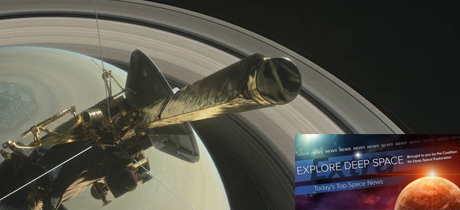In Today’s Deep Space Extra… The long running, NASA led Cassini mission to Saturn, which counts observations of two moons with possible habitable environments, is coming to a dramatic conclusion with dives between the large planet and its famed rings.
Space Science
Cassini about to begin grand finale dives into Saturn’s atmosphere
Spacepolicyonline.com (4/4): Launched in 1997, the NASA led Cassini mission at Saturn is about to run out of fuel. In order to ensure the spacecraft does not plummet into and contaminate the moons Enceladus or Titan, which may harbor environments supportive of biological activity, Cassini will begin a series of mission ending orbital maneuvers this month. Cassini will dive between the planet’s innermost ring and Saturn. The 22 orbits will permit studies of the rings and conclude with a breakup of Cassini in Saturn’s atmosphere in mid-September.
Trappist-1 is showing a bit too much flare
Universe Today (4/4): In February, the search for habitable planets beyond the solar system found good news in the announced discovery of Trappist-1, a not too distant red dwarf star with multiple rocky planets orbiting in the habitable zone. New details about Trappist-1’s volatile nature, more than 40 flaring events in 80 days, may dampen the enthusiasm.
NASA spacecraft halfway between Pluto and next smaller stop
Associated Press via Washington Post (4/4): NASA’s New Horizons spacecraft, famed for its first ever flyby of distant Pluto in July 2015, is officially at the midpoint of its billion mile journey to a second destination, the smaller Kuiper Belt object, 2014 MU69. A flyby is planned for January 1, 2019.
Competing ideas abound for how Earth got its moon
Science News (4/4): A debate over the source of the Earth’s moon suggests that multiple impacts with small bodies. rather than a single large impact early in the solar system’s history, might have been the genesis.
Low Earth Orbit
Rogers calls for separate “Space Corps” within the Air Force
Space News (4/4): U.S. Representative Mike Rogers, chair of the U.S. House Armed Services strategic forces subcommittee, intends to initiate steps establishing a Space Corps, a separate branch of the military within the Department of Defense, much as the Air Force was split off from the U.S. Army Air Corps decades ago. Speaking before the 33rd annual Space Symposium in Colorado Springs on Tuesday, Rogers characterized the national security space structure as ‘broken.”
As RD-180 ban looms, space companies make steady progress on new launch technologies
Defense News (4/4): Imports of Russia’s RD-180 rocket engine, a propulsion source for the first stage of United Launch Alliance’s Atlas 5 rocket, are to come to an end by December 31, 2022. The Pentagon may be prepared to invest more on a domestic replacement. Aerojet Rocketdyne, Orbital ATK, United Launch Alliance and SpaceX are currently leading efforts to develop new rocket engines.
ULA: ‘Jury’s out’ on rocket reusability
Florida Today (4/5): United Launch Alliance CEO Tony Bruno challenges the value of rocket booster reuse after a congratulatory statement to SpaceX on the company’s successful launch of a Falcon 9 rocket with a communications satellites using a first stage that had flown previously. ULA’s new Vulcan launch vehicle will recover the rocket engines for refurbishment rather than the entire rocket stage.
Returning astronauts safely: Starliner test provides crucial re-entry data
Spaceflight Insider (4/3): New Mexico’s Spaceport America is the site of parachute testing for Boeing’s CST-100 Starliner, one of two spacecraft in development under NASA’s Commercial Crew Program to transport astronauts to and from the International Space Station. A helium balloon is carrying a capsule mockup to high altitude for the parachute release. The most recent test was carried out on March 10.
Le Gall confident French Guiana launches will resume “in the coming days”
Space News (4/4): Representatives of the French government are working to end labor strikes and political protests that have prompted a suspension of Arianespace launch activities at the European spaceport in French Guiana. Jean-Yves Le Gall, president of the French space agency, predicted the disruptions will be settled soon in remarks before the 33rd annual Space Symposium in Colorado Springs. Preparations for at least five missions have been held up.

